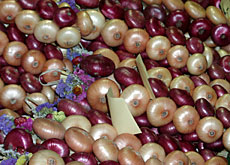Onion market is Bern’s recipe for success

Bern's annual Onion Market, held traditionally on the fourth Monday in November, has again drawn thousands of visitors to the Swiss capital.
It is one of the biggest annual markets in Switzerland and the people who bring their colourfully braided onions have spent months preparing for the big day.
There are onions disguised as gentlemen in smoking jackets, as alarm clocks, and there are even onion Mickey Mouses.
But of the hundreds of market stalls crowded into the squares in front of the Swiss parliament, it is still the braided “onion ropes” and wreaths that people come to admire and buy. There is no other market like it in Switzerland.
“I just want to take one home as a souvenir,” says a woman as she shells out SFr12 ($8) for a 12-inch rope.
Flower crown
Each one is a decorative mosaic of special varieties of yellow and red onions, and often garlic bulbs, plaited around strips of straw. They are crowned with delicate bouquets of dried flowers.
Up to 70 tons of onions are still sold each year at the market, even though the stands offering knick-knacks, antiques and mulled wine now outnumber the onion-sellers.
And unlike the wind-up toys and costume jewellery, preparing onion braids for this special occasion is a labour of love.
“I’ve made about 600 onion braids this year and each one by hand,” says Rolf Hediger, who in the same breath on this cold November morning exudes confidence that they will be all gone by the end of the day.
Many of the onion sellers, like Hediger, drive in with their produce from the fertile farming region known as “Seeland” in the neighbouring canton of Fribourg.
Dialects add flavour
It’s a bilingual area and listening to the mix of thick French and Swiss-German dialects adds flavour to the whole affair.
Their presence reinforces the widely-held belief that Bern granted them the right to sell their produce each November in the town as an expression of gratitude after they came to the aid of the Bernese following a great fire in the early 15th century.
However, the market is more likely to have originated in the 18th century and was associated with the “Martinmas Fair”, which was held annually in the late autumn.
Tradition
Hediger says the custom goes back in his family about 80 years and he does it because he simply enjoys carrying on the tradition.
As he explains, the onion seeds are planted each spring and harvested by hand at the beginning of August. They are then left to dry for about three weeks.
“I start plaiting them about a month before the market. It’s a lot of work since I have to plait each one by hand.”
Hediger says his grandmother taught him the craft, showing him how to peel away the outer skin in order to reveal the shiny inner layer without ripping it.
Still, he says, half of the harvest has to be discarded due to bruising and unsightly, torn peels.
Market day
It is 5am. The first trains arrive in Bern from all points of the compass. Hediger has hired two helpers to cope with the onslaught; his wife serves up mulled wine, apple punch and pumpkin soup.
Hediger says he wants to pass on the tradition to his young children but worries about the future of the market.
“There are simply not enough people in the region who want to continue because it’s so labour intensive,” he says.
Hediger’s grandmother has her own stand at the other end of the square, as do an aunt and an uncle. The latter claims to sell the longest onion rope at the market – at nearly two metres in length.
The family clearly has a great passion for onions even though, as Hediger confides, few of them can stand the taste!
swissinfo, Dale Bechtel
It is believed to have originated in the 18th century.
Up to 70 tons of onions are sold each year at the market.
It draws thousands of visitors from across the country.
Onion tarts and mulled wine are among the specialities sold at the stalls and in Bern’s cafés on this day.

In compliance with the JTI standards
More: SWI swissinfo.ch certified by the Journalism Trust Initiative









You can find an overview of ongoing debates with our journalists here . Please join us!
If you want to start a conversation about a topic raised in this article or want to report factual errors, email us at english@swissinfo.ch.